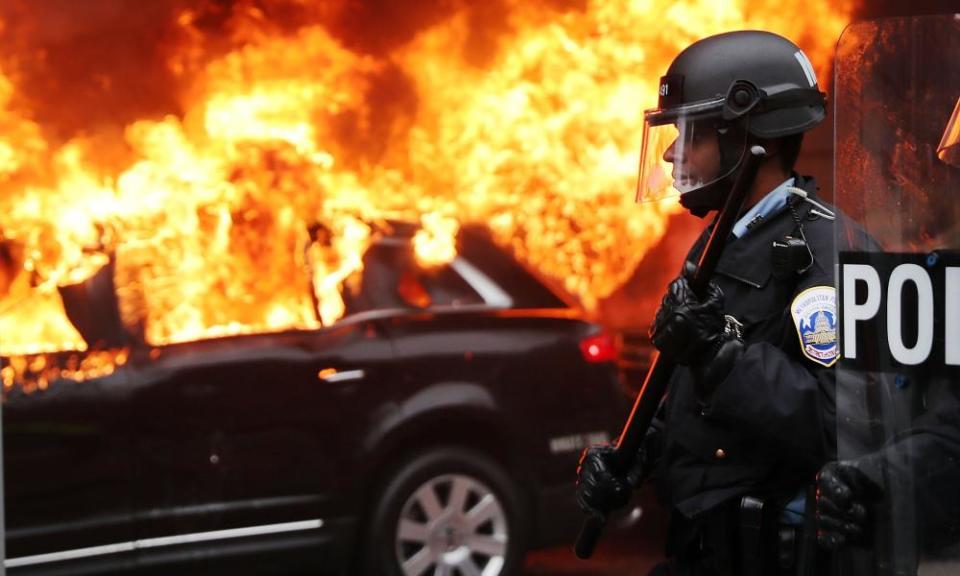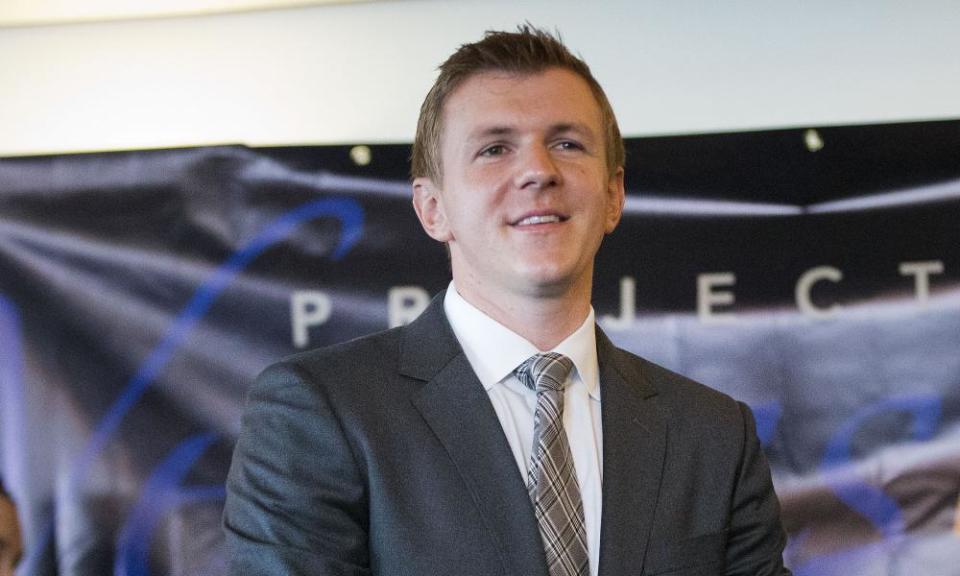US government uses Project Veritas video in trial of anti-Trump protesters
Footage from the far-right group is being relied on as evidence against protesters arrested at Trump’s inauguration, raising criticism from activists

Federal prosecutors targeting anti-Trump protesters are relying on video evidence from Project Veritas, a far-right group under fire this week for allegedly trying to dupe the Washington Post with a false story of sexual misconduct.
The US attorney’s office submitted the footage in court on Tuesday as part of an ongoing trial against activists who protested Donald Trump’s inauguration and now face conspiracy and rioting charges that could lead to decades in prison.
Prosecutors played the video – which reportedly showed undercover footage from a meeting of activists – one day after the Washington Post reported that Project Veritas had sent a woman undercover pretending to be a victim of Roy Moore, the US Senate candidate accused of sexual misconduct.
The decision to use video from a discredited ultra-conservative group known for ethically questionable tactics has drawn criticisms from civil liberties groups, who have argued that the federal government under Trump is aggressively prosecuting activists who oppose the president.
“It’s absolutely shocking that the prosecutors went on record today saying they are relying on a Project Veritas video,” said Jude Ortiz, a member of the organizing crew of Defend J20 Resistance, a group supporting the nearly 200 people facing charges related to the Washington DC protests of Trump on 20 January.
“It’s a dubious piece of evidence at best, and it’s appalling that it’s coming from the far right,” said Ortiz, who attended the hearing.
Hundreds were arrested during inauguration day demonstrations – including journalists, legal observers and medics – drawing criticisms that law enforcement was issuing overly broad charges against people caught up in the chaos, without specific evidence tying them to alleged crimes. Though some charges were later dropped, many are still on trial for conspiracy, rioting and property destruction allegations, and some could face 60-year prison sentences.
The video comes from Project Veritas’ infiltration of a meeting where activists discussed plans to disrupt inauguration activities.
The use of Project Veritas footage is the latest example of prosecutors relying on evidence linked to controversial far-right sources. The US attorney’s office has also submitted video from the Oath Keepers, a rightwing militia group that has been present at “alt-right” rallies.

Project Veritas founder James O’Keefe has also faced scrutiny for past undercover efforts and was convicted in 2010 for his role in a scheme to make illegal recordings at the office of a Democratic senator. The group’s apparent effort to embarrass the Washington Post, however, backfired this week after the newspaper exposed the alleged sting operation.
“The government is untroubled by their collaboration with authoritarian rightwingers,” said Sam Menefee-Libey, a member of the Dead City Legal Posse, an activist group supporting the protesters on trial.
Menefee-Libey, who was in court on Tuesday, said he believed the judge should not have allowed the video to be presented in the first place, given Project Veritas’ history.
“Fundamentally, this shows that the state doesn’t have very much to go on,” said James Anderson, a member of It’s Going Down, an anti-fascist collective that has promoted protests against Trump and the “alt-right”. Prosecutors have also used comments an activist made on an It’s Going Down podcast as evidence in the ongoing trial.
“The fact that they have to fall back on using these far-right trolls, which are widely discredited, not only speaks to the illegitimacy of their case, but also a fundamental relationship between the Trump administration and the alt-right,” Anderson said.
Erin Lemkey, a Washington DC protester who is facing charges for J20 activities, said the Project Veritas video revealed weaknesses in the prosecution’s case.
“They’re using whatever stuff they can drag up,” said Lemkey, who has not yet gone to trial. “It’s doubly strange that they would be taking such a discredited source.”
A spokesman for Project Veritas defended the use of the video as “entirely appropriate”. A spokesman for the US attorney’s office for DC declined to comment.
The J20 demonstrators are not the only progressive activists who have faced harsh prosecutions for protest activities this year. In May, a leftwing activist was convicted after she was arrested for laughing during a confirmation hearing for attorney general Jeff Sessions. Anti-fascist demonstrators in California have also faced serious felony charges.
The link to Project Veritas also raises broader concerns about the US government’s willingness to investigate and prosecute violence committed by white supremacists and neo-Nazis, activists said. Trump faced heated backlash after he failed to condemn neo-Nazis in Virginia in the wake of deadly violence involving white supremacists earlier this year.
“Why are there no conspiracy charges for the far right?” said Anderson. “That’s a huge question.”

